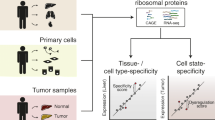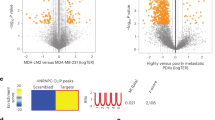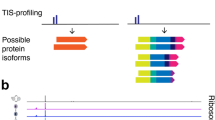Abstract
The human gene sequences encoding the translation-associated functions of alpha-subunit of elongation factor 1 (EF-1 alpha) and the ubiquitin carboxyl extension protein (HUBCEP80) have been isolated by differential cDNA screening, and found to have significantly higher levels of expression in fibroadenomas (benign) compared with carcinomas (malignant) of the breast. These data parallel our previous findings that the acidic ribosomal phosphoprotein P2 also has higher expression levels in the benign breast tumours (Sharp et al., 1990). In situ hybridisation has shown these genes to be expressed predominantly in the epithelium of breast tumours.
Similar content being viewed by others
Author information
Authors and Affiliations
Rights and permissions
About this article
Cite this article
Adams, S., Sharp, M., Walker, R. et al. Differential expression of translation-associated genes in benign and malignant human breast tumours. Br J Cancer 65, 65–71 (1992). https://doi.org/10.1038/bjc.1992.12
Issue Date:
DOI: https://doi.org/10.1038/bjc.1992.12
- Springer Nature Limited
This article is cited by
-
The role of ribosomal proteins in the regulation of cell proliferation, tumorigenesis, and genomic integrity
Science China Life Sciences (2016)
-
Molecular characterization and expression analysis of five different elongation factor 1 alpha genes in the flatfish Senegalese sole (Solea senegalensis Kaup): Differential gene expression and thyroid hormones dependence during metamorphosis
BMC Molecular Biology (2008)
-
Production and characterization of amplified tumor-derived cRNA libraries to be used as vaccines against metastatic melanomas
Genetic Vaccines and Therapy (2005)
-
Characterization of a maize ribosomal P2 protein cDNA and phylogenetic analysis of the P1/P2 family of ribosomal proteins
Plant Molecular Biology (1996)




